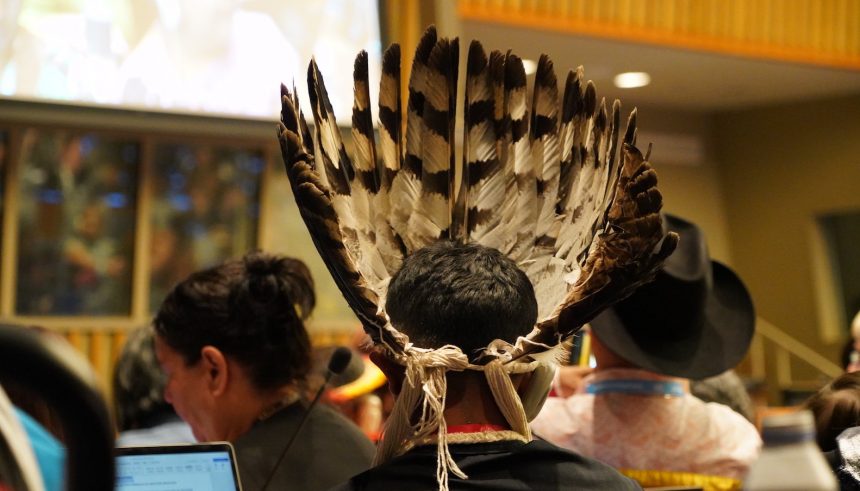This story is published as part of the Global Indigenous Affairs Desk, an Indigenous-led collaboration between Grist, High Country News, ICT, Mongabay, Native News Online, and APTN. Last September, Nicaraguan state security forces arrived at Indigenous Miskitu leader Brooklyn Rivera’s home in Bilwi, on the North Caribbean coast. Pretending to be health workers, officers allegedly handcuffed Rivera and beat him with batons before putting him in the back of an ambulance and driving away. More than six months later, Rivera’s family still doesn’t know where he is, or if he is alive.
Although Rivera had spent decades fighting for Miskitu autonomy and land rights, Carlos Hendy Thomas, another Miskitu leader, said that the recent targeting began with Rivera’s April 2023 trip to New York for the United Nations Permanent Forum on Indigenous Issues, or UNPFII, the world’s largest gathering of Indigenous leaders and activists, and a place for Indigenous peoples to bring attention to issues their communities face. Hendy Thomas said that before Rivera left for New York, government officials warned him not to speak out against the government. He did so anyway, and when Rivera tried to board a plane to return home, he was told that the Nicaraguan authorities had not approved his reentry. Instead, Rivera flew to Honduras and crossed the border back into Nicaragua to return to Bilwi. A few days before his arrest, Hendy Thomas told Rivera he should leave the country for his own safety, but Rivera insisted his people needed him. That was the last time the two spoke.
This year, Hendy Thomas came to the Permanent Forum to ask the United Nations to pressure Nicaragua for information. “We are hoping that by coming here, at least this would come to light, and the U.N. would intervene to get him out from jail, if he’s still in jail, or if he’s even alive,” Hendy Thomas said.
Rivera’s situation is reflected in a growing trend of Indigenous leaders facing retaliation for speaking out at UNPFII and other international spaces. With few options for Indigenous peoples to advocate in their own countries, especially where regimes refuse to even recognize their existence, many leaders turn to the international community for help. But even that option is becoming less feasible for many Indigenous peoples. According to the Office of the United Nations High Commissioner for Human Rights, the number and severity of reprisals against people for engaging with the United Nations system has increased. Just in the past two years, Indigenous leaders attending U.N. meetings have faced attempted kidnapping, harassment, arrest, intimidation, online censorship, travel bans, smearing, and other forms of reprisal.
Hernan Vales, the chief of the Indigenous Peoples and Minorities Section at the Office of the United Nations High Commissioner for Human Rights, said that his office has seen an increase in reported cases of reprisals, but declined to give specific numbers. Vales and other U.N. experts also believe that there may be many more cases that go unreported. A 2023 U.N. report on the issue also says that more people are simply choosing not to engage with the U.N. because they are afraid of repercussions. According to the report, for example, 38 Indigenous Yukpa people decided not to meet with U.N. officials in Venezuela after being stopped by military forces while on their way to the gathering.
“We cannot tolerate those who bring critical perspective to the United Nations being silenced,” Vales said in a statement. “We need to do more.” But even with the increased attention and resources available, UNPFII forum members, U.N. experts, and Indigenous leaders say that the problem is still getting worse. Roberto Borrero, who is president of the United Confederation of Taíno Peoples, has attended every session of the Permanent Forum since it began in 2002 and said that the frequency and severity of reprisals has increased, and that the U.N. needs to do more.
“It really speaks to the credibility of the U.N. to highlight and follow up on this issue,” he said. “If they don’t, the U.N. is going to be even more increasingly seen as ineffective.”
Brooklyn Rivera poses for a photograph in 1988. The Denver Post via Getty Images
Last year, Edward Porokwa, an Indigenous Maasai leader from Tanzania, attended UNPFII to call attention to human rights violations carried out against Maasai communities, including forced evictions, land-grabbing, and resource deprivation. At the forum, said Porokwa, Tanzanian officials followed him, took videos and pictures without his permission, and said that he was not a legitimate representative. Porokwa said that throughout the forum, he also received anonymous phone calls saying that what he was doing was not right and the government was watching him.
In Tanzania, Maasai activists have faced arrest and persecution, and Porokwa, spooked by the warnings, decided not to return home for nearly six months. “It was very terrible,” he said. “I could not meet my family. I could not communicate with everybody, because they made me really feel like my life was in danger.” Despite the incident, Porokwa returned to UNPFII this year with an even larger delegation of Maasai leaders.
Indigenous leaders believe that governments are targeting their U.N. participation because it embarrasses them on the world stage. Exposing human rights abuses to the international community can also have financial impacts. Just this week, the World Bank announced that it is suspending $50 million in funding for a tourism project in Tanzania that has faced allegations of killings, forced evictions, and rape.
In a statement delivered at UNPFII, Hamisi Malebo, the executive secretary of the United Republic of Tanzania’s National Commission for UNESCO, denied what he called the “baseless and factually inaccurate” allegations made by Maasai leaders. “Tanzania is guided by the rule of law and respect for human rights,” Malebo said. “The government does not condone acts of threat, intimidation, and harassment of its citizens, human rights defenders, and other nonstate actors pursuing this common objective.”
Brian Keane, director of Land Is Life, a nonprofit that advocates for Indigenous rights, says that although threats at the U.N. tend to be less overt than cases like Rivera’s, intimidation and harassment should be taken just as seriously, especially knowing that they can lead to more serious repercussions back home. “It’s a big issue,” he said. “There’s this kind of constant bullying that goes on trying to silence people that are here to speak up for their rights,” he said.
On the second day of the two-week UNPFII session, Hindou Oumarou Ibrahim, Indigenous Mbororo from Chad and the chair of the forum, delivered a statement condemning any reprisals.
Hindou Oumarou Ibrahim speaks during the 2024 U.N. Permanent Forum on Indigenous Issues. Ines Belchior / Ronja Porho / UN DESA DISD
Last year, a young Indigenous woman from Asia whose name Grist is withholding to protect her identity, was on her way to her local airport to attend UNPFII, when her car was surrounded by a convoy of government vehicles. Officials attempted to drag her out of her car, and it was only after bystanders rushed to her defense that she was eventually permitted to leave. She said she is more careful now. But even after the experience, she returned to UNPFII this year. “I have to continue my work,” she said. “I see my meaning of life that way.”
In July 2022, Yana Tannagasheva, an Indigenous Shor activist from Kemerovo Oblast, Russia, attended a U.N. meeting in Geneva to speak about the harms of coal mining in her community. After she spoke, Tannagasheva and other witnesses say a Russian representative aggressively approached her and demanded to know her name and personal contact information. Tannagasheva, who has lived in exile in Sweden for six years, says the experience shattered her sense of security. “It was so awful. I wanted to cry,” she said. “I was surprised it can happen during a U.N. session.” Representatives from the Bolivarian Republic of Venezuela, the Republic of Nicaragua, the Russian Federation, and the United Republic of Tanzania did not respond to requests for comment.
Binota Moy Dhamai, Tripura from the Chittagong Hill Tracts in Bangladesh and the chair of the Expert Mechanism on the Rights of Indigenous Peoples, said that reprisals threaten the entire international system and its goals. “If it continues like this then what is the meaning of talking about the sustainable development goals? What is the meaning…





